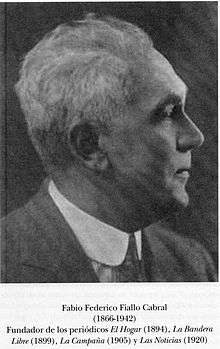Fabio Fiallo
Fabio Fiallo, in full Fabio Federico Fiallo Cabral (February 3, 1866 – August 29, 1942) was a Dominican writer, poet and politician. Fiallo was born in the city of Santo Domingo, Dominican Republic on February 3, 1866. His parents were Juan Ramón Fiallo Rodríguez (a Dominican politician, Member of the Congress of the Dominican Republic in 1867) and Ana María Cabral y Figueredo (from an upper class family). From a young age he had the political guidance of his father, who since the administration of President General José María Cabral y Luna was part of important committees to negotiate a Treaty of Peace, Friendship and Commerce between Haiti and the Dominican Republic. After joining the Faculty of Law at the Instituto Profesional de Santo Domingo (later as Instituto Profesional, en Universidad de Santo Domingo and now as Universidad Autónoma de Santo Domingo), he abandoned his studies to devote himself to politics and poetry.[2][3]
Fabio Fiallo | |
|---|---|
 | |
| Born | Fabio Federico Fiallo Cabral 3 February 1866 |
| Died | 29 August 1942 Havana, Cuba |
| Occupation | Writer, politician |
| Spouse(s) |
Prudencia Lluberes Contreras
( m. 1892; died 1897)María Luisa Bonetti Ernest ( m. 1905) |
| Relatives |
|
He was also uncle of fashion designer Oscar de la Renta and the politician Viriato Fiallo. The latter married his first cousin, Fabio’s daughter, Prudencia Fiallo Lluberes.
| Ancestors of Fabio Fiallo | ||||||||||||||||||||||||||||||||||||||||||||||||||||||||||||||||||||||||||||||||||||||||||||||||||||||||||||||||||||||||||||||||||||||||||||||||||||||||||||||||||||||||||||||||||||||||||||||||||||||||||||||||||||||||||||||||||||||||||||||||||||||||||||||||||||||||||||||||||||||||||||||||||||||||||||||||||||||||||||||||||||||||||||||||||||||||||||||||||||||||||||||||||||||||||||||||||||||||||||||||||||||||||||||||||||||||||||||||||||||||||||||||||||||||||||||||||||||||||||||||||||||||||||||||||||||||||||||||||||||||||||||||||||||||||||||||||||||||||||||||||||||||||||||||
|---|---|---|---|---|---|---|---|---|---|---|---|---|---|---|---|---|---|---|---|---|---|---|---|---|---|---|---|---|---|---|---|---|---|---|---|---|---|---|---|---|---|---|---|---|---|---|---|---|---|---|---|---|---|---|---|---|---|---|---|---|---|---|---|---|---|---|---|---|---|---|---|---|---|---|---|---|---|---|---|---|---|---|---|---|---|---|---|---|---|---|---|---|---|---|---|---|---|---|---|---|---|---|---|---|---|---|---|---|---|---|---|---|---|---|---|---|---|---|---|---|---|---|---|---|---|---|---|---|---|---|---|---|---|---|---|---|---|---|---|---|---|---|---|---|---|---|---|---|---|---|---|---|---|---|---|---|---|---|---|---|---|---|---|---|---|---|---|---|---|---|---|---|---|---|---|---|---|---|---|---|---|---|---|---|---|---|---|---|---|---|---|---|---|---|---|---|---|---|---|---|---|---|---|---|---|---|---|---|---|---|---|---|---|---|---|---|---|---|---|---|---|---|---|---|---|---|---|---|---|---|---|---|---|---|---|---|---|---|---|---|---|---|---|---|---|---|---|---|---|---|---|---|---|---|---|---|---|---|---|---|---|---|---|---|---|---|---|---|---|---|---|---|---|---|---|---|---|---|---|---|---|---|---|---|---|---|---|---|---|---|---|---|---|---|---|---|---|---|---|---|---|---|---|---|---|---|---|---|---|---|---|---|---|---|---|---|---|---|---|---|---|---|---|---|---|---|---|---|---|---|---|---|---|---|---|---|---|---|---|---|---|---|---|---|---|---|---|---|---|---|---|---|---|---|---|---|---|---|---|---|---|---|---|---|---|---|---|---|---|---|---|---|---|---|---|---|---|---|---|---|---|---|---|---|---|---|---|---|---|---|---|---|---|---|---|---|---|---|---|---|---|---|---|---|---|---|---|---|---|---|---|---|---|---|---|---|---|---|---|---|---|---|---|---|---|---|---|---|---|---|---|---|---|---|---|---|---|---|---|---|---|---|---|---|---|---|---|---|---|---|---|---|---|---|---|---|---|---|---|---|---|---|---|---|---|---|---|---|---|---|---|---|---|---|---|---|---|---|---|---|---|---|---|---|---|---|---|---|---|---|---|---|---|---|---|---|---|---|---|---|---|---|---|---|---|---|---|---|---|---|---|---|---|---|---|---|---|---|---|---|---|---|---|---|---|---|---|---|---|---|---|---|---|---|---|---|---|---|---|---|---|---|---|---|---|---|---|---|---|---|---|---|---|---|---|---|---|---|---|---|---|---|---|---|---|---|---|---|---|---|---|---|---|---|---|---|
| ||||||||||||||||||||||||||||||||||||||||||||||||||||||||||||||||||||||||||||||||||||||||||||||||||||||||||||||||||||||||||||||||||||||||||||||||||||||||||||||||||||||||||||||||||||||||||||||||||||||||||||||||||||||||||||||||||||||||||||||||||||||||||||||||||||||||||||||||||||||||||||||||||||||||||||||||||||||||||||||||||||||||||||||||||||||||||||||||||||||||||||||||||||||||||||||||||||||||||||||||||||||||||||||||||||||||||||||||||||||||||||||||||||||||||||||||||||||||||||||||||||||||||||||||||||||||||||||||||||||||||||||||||||||||||||||||||||||||||||||||||||||||||||||||
Career
His political activities limited his career as a writer. He was imprisoned for defending Dominican independence during the American occupation of the Dominican Republic (1916–24). He was a founder of the newspapers El Hogar (1894), La Bandera Libre (1899), La Campaña (1905) y Las Noticias (1920) and was also a contributor to the Listín Diario and El Lápiz.
Fiallo was arrested in the last months of 1900 with Arturo Pellerano Alfau, director of Listín Diario during the escalations of repression against the press of the Liberal government of Juan Isidro Jiménes.
He was a member of the National Press Association, directed in 1916 by Arturo J. Pellerano Alfau and which also belonged Américo Lugo, Conrado Sanchez, Juan Durán, Manuel A. Machado and Félix Evaristo Mejía, among others. Through this group the first complaints to the international community in opposition to the U.S. occupation of the Dominican Republic were performed.
In 1916, Fiallo was apprehended by authorities, under the unfounded allegation of being involved in the revolutionary movement started on April 14 headed by Desiderio Arias being which was being held in the tribute (Fortaleza Ozama). He was sentenced to five years of forced labor and was ordered to pay a five thousand dollar fine for having published an article in the Listin Diario before being approved by the censorship committee. However, the nationalist Fiallo’s work did not end with the demise of the Free Flag movement, but instead he became more radical.
In his "Fabio Fiallo in the Free Flag: 1899–1916," Rafael Dario Herrera writes: "In September 1899, he founded the newspaper The Flag Royalty circulating three times a week in major urban centers, and, like most print media at the time, had four pages, the first of which, contrary to what happens today, was entirely devoted to advertising and on the inside pages included opinion pieces with little news. At the time, newspapers were still generating income with fixed and placed with obituaries that lawyers and merchants, usually foreign subscriptions. Newspaper survived until early 1900, and defined itself , in this first time, as a "political and general interest " publication. Later reappeared in 1915 until its demise in late 1916. free Banner is a newspaper combat, scathing, incisive, teller of national issues. Emerges in a transitional stage between the defunct dictatorship Heureaux (July 1899) and the government of Jiménes (November 1899). Your target is outlined in the initial editorial : "We will fight for the final victory in the institutions and practice of liberal ideas will preach freedom at all costs the depredations, the nepotism, cliques, monopolies, have against us . . yours" . Although the first step in that circulated Banner Royalty had not yet opted the Jimenistas groupings (or bowling) and Horacistas (coludos), its pages contain sharp criticism against the first as Jimenes was seen as the main opposition lilisista of dictatorship, especially for his expedition aboard the steam Fanita in 1898, and that had obvious sympathy with the dictatorship between groups of literate urban Fiallo was part of that. Thus, in October 1899, before the election, with reservations accepted Fiallo candidacy Jiménes.6 died in Havana, Cuba, 28 August 1942. His remains were transferred to Dominican Republic in 1977 by order of the government then presided Dr. Joaquín Balaguer.
Works
- Primavera sentimental (1902)
- Cuentos frágiles (1908)
- Cantaba el ruiseñor (1910)
- Canciones de la tarde (1920)
- Plan de acción y liberación del pueblo dominicano (1922)
- Jurb (1922)
- La cita (1924)
- Canto a la bandera (1925)
- La canción de una vida (1926)
- Las manzanas de Mefisto (1934)
- El balcón de Psiquis (1935)
- Poemas de la niña que está en el cielo (1935)
- Sus mejores versos (1938)
References
- Read, Jaime Alberto (11 December 2010). "Los Fiallo Cabral". Cápsulas Genealógicas (in Spanish). Hoy.
- Nunn, Marshall (1 January 1940). "Fabio Fiallo". Hispania. 23 (2): 116–120. doi:10.2307/332373. JSTOR 332373.
- "Fabio Fiallo - Poetry & Biography of the Famous poet - All Poetry".